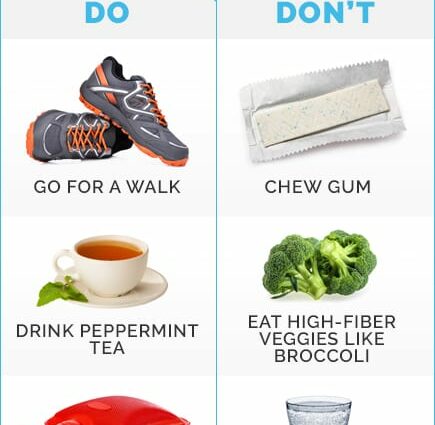“With the pace of life accelerating, meals are too often taken on the go, mechanically, begins Sophie Dimanche-Lahaye *. Too much hunger also hastens the way of swallowing food. Because the body, in energy crisis, needs to respond quickly to its needs, ”she explains. Consequence: the pieces are quickly swallowed, without any real effort to chewing, remain coarse, which takes much more work on the stomach and can cause downstream bloating. Indeed, the digestion is a complex process, the first stage of which begins in the mouth. “The food ingested, crushed by the teeth, forms a porridge: it is the beginning of digestion thanks to the richness of the saliva in enzymes. We have, in the oral cavity, sensory sensors which inform the digestive glands, in particular the pancreas, the liver and the gall bladder, on the quantities of enzymes and bile to be released for the good progress of digestion. The contact time between these sensors and our food is decisive in preventing bloating, ”continues the specialist. When little chewed foods arrive in the small intestine, the quantity of enzymes may not be sufficient … “This is the intestinal flora which will then feed on it by producing gas. »Taking the time to chew well with each meal promotes feeling full and prevents bloating. “If you don’t have a lot of time for breakfast, it’s best to eat smaller amounts, but chew well. You have the option of having a dessert or a snack at another time of the day, ”advises Sophie Dimanche-Lahaye.
Foods to avoid
“Lactose from animal milk, but also raw vegetables which contain fairly solid fibers and thick skins (peppers, cucumbers, tomatoes, etc.) promote fermentation and therefore the production of gas, ”warns the nutritionist. Crucifers, garlic, onions, artichokes or apricots also tend to swell the belly. “Also beware of excess starchy foods. A digestible plate should be made up of half of vegetables, a quarter of protein, and a quarter of starch, ”recalls the specialist.
The right foods
Clementine
Sweet and well tolerated, clementine does not cause bloating.
In the fruit department, this is also the case for raspberries and strawberries … But prefer seasonal varieties, rich in vitamins. Wait until you have fully digested your meal before consuming one
of these fruits. As a snack, it’s a good option!
Infusions
With thyme, green anise, rosemary, lemon balm, peppermint, chamomile or ginger… Anything is allowed as long as they are tasted outside of meals and alternately with mineral water. They help calm the “excitement” of the intestines. In addition, thyme and rosemary have cleansing powers. They prevent the development of bad flora.
The banana
This “fruit-culent” is your ally! Bananas are particularly well tolerated by the digestive system. In general, choose fruit that is neither too ripe nor too little. Good to know: poached cooked fruits are better tolerated. But beware, the sweetening power of the fruits increases with cooking and blending. For pregnant women, better to prefer real chewable fruit medium rare.
Our video article:
Spices
Cumin, cardamom or ginger can reduce the creation of gas
and promote their evacuation. You can use them to spice up a dish, but they can also be consumed in the form of herbal teas. Take a piece of ginger, split it and let it steep for a few minutes in hot water. Then you can drink your herbal tea in small sips.
Fennel
This plant with an anise flavor, which can be eaten raw or steamed, has an action on the reduction
bloating. During breastfeeding, it can also be consumed in the form of herbal tea. Thus, it will relieve a gas baby. But we can also taste it in the form of seeds that we add to recipes to flavor them.
Walnut oil
Added “raw” to steamed foods, for example, walnut oil is very tasty. Associated with organic cider vinegar, its interest for the intestine is undeniable. In all cases, prefer extra-virgin vegetable oils from first cold pressing. And avoid cooking the other fats you use for cooking as much as possible.
The carrot
This root vegetable, rather steamed or sautéed Asian style, is well tolerated by the stomach. His soluble fiber are very sweet, as is the case with other seasonal vegetables, such as squash, pumpkin or parsnip. Remember to peel them well before cooking them, especially if their skin is a little thick.
Our video article:










